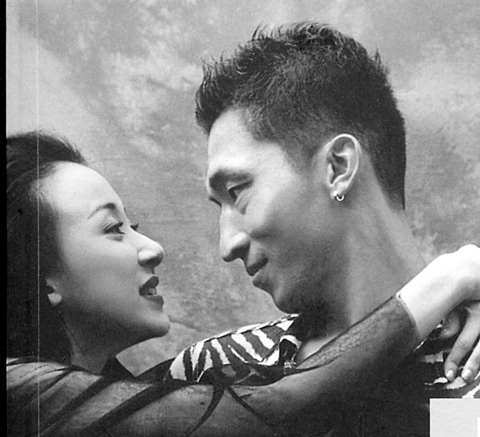In Taipei, where designer brands such as LV and Gucci are worshipped by the rich and middle class alike, fashion-wired ladies sporting dazzling dresses and premium accessories are all just par for the course at parties and trendy night-life venues these days.
And the city's stock of luxurious wares just got a little bigger with the recent addition of Taiwanese designer Kenji Du's (
Du's creations recall the shoe brand Manolo Blahnik, which achieved worldwide fame on the heels -- literally -- of Sarah Jessica Parker's character Carrie in the US hit TV series Sex and the City. Du's swanky and oh-so sexy high-heels of red, black and metallic-hued velvet are offset by encrusted diamonds and colored gems. The clientele for such footware are none other than the swelling ranks of modern, monied women not afraid of embracing their femininity, and who obviously enjoy being the center of attention.

Some may wonder just how high a girl has to prop up her heels to garner all that extra attention. Du's high-heels look high enough to break the wearer's ankles, but -- like those of the Manolo Blahnik -- Du's creations are said to be both fashionable and practical. "I have walked in his shoes for hours already, and my feet don't feel sore at all," a girl sporting Du's shoes attested at the opening party for his new establishment.
A good friend of the age-resistant star Stephanie Hsiao (
"I worked as a model and a dancer and sold clothes as a street-side vendor. It wasn't until 10 years ago that I was determined to become a fashion designer," Du said.

PHOTOS COURTESY OF KENJI DU
The 40-year-old designer's first encounter with fashion was at an award ceremony for new local designers held by the Taiwan Textile Federation (
Several years passed as Du's modeling job took off and gave him a life of comfort. He put his fashion designer dream on hold until he began pushing 30 and was reminded of the vow he had made to himself. With only an elementary school education, Du had to start from the bottom. "I began from the basics. It was really difficult for me since most designers didn't want to take on a 30-year-old assistant," Du said.
After a series of frustrations and setbacks, Du finally landed an apprenticeship at a local designer's studio and before long, he attended the textile federation's award ceremony again -- this time, as an award-receiver.
A couple years ago, Du set out to establish his own brand -- Kenji -- armed with a small loan of NT$300,000.
And like his shoes, his distinctive outfits have sexy written all over them. For his spring/summer collection, elegantly cut dresses and mini-skirts of bright shaded chiffon and lace offset by colored sequins draw out a feminine sweetness from the wearer's curves and lines. "I believe in simple cutting because I think over-accessorizing covers up a woman's natural contours," Du said. "For me, being sexy doesn't mean exposing lots of cleavage, navel and leg. Women can wear suits and still be sexy."
Turning away from mass production, Du chooses to present his creations as hand-made haute couture that can fetch high prices -- NT$40,000 for an evening dress, for example. His shoes' price tags are relatively low, fetching between NT$5,000 to NT$15,000. Another line of more casual footwear for young women is also on its way to the market.
Beside samples of haute couture dresses and high-heels, visitors at Du's boutique at the newly opened ATT Qui on Zhongxiao East Road can also check out the colorful handmade handbags from Ipa-Nima, the fast-rising handbag and accessory brand adored by Hollywood stars and models, and whose celebrity clients include former US first lady Senator Hillary Clinton and Asian diva Faye Wang (王菲).
Created by Hong Kong-born, Vietnam-based designer Christina Yu, who has graced the pages of Vogue and Asiaweek, Ipa-Nima's exotic creations are funky, boldly fusing colors and fabrics. Yu splashes sea blue, spring green, canary yellow, and gold and silver together on leather, hand-woven silk, cotton, and linen. Such a fusion screams fun, and satisfies women's desire to be fashionably different without going overboard. For women seeking a more dressy look, there are a series of small party handbags with sequins and gems, while cotton and canvas bags boasting floral patterns are good for work environments.
What's more, uniqueness in the form of Ipa-Nima access-ories won't cost you an arm and a leg. Imagine that -- walking out of a boutique with not only a one-of-a-kind look, but just enough spare change to get you home on the MRT to boot.

In the March 9 edition of the Taipei Times a piece by Ninon Godefroy ran with the headine “The quiet, gentle rhythm of Taiwan.” It started with the line “Taiwan is a small, humble place. There is no Eiffel Tower, no pyramids — no singular attraction that draws the world’s attention.” I laughed out loud at that. This was out of no disrespect for the author or the piece, which made some interesting analogies and good points about how both Din Tai Fung’s and Taiwan Semiconductor Manufacturing Co’s (TSMC, 台積電) meticulous attention to detail and quality are not quite up to

April 21 to April 27 Hsieh Er’s (謝娥) political fortunes were rising fast after she got out of jail and joined the Chinese Nationalist Party (KMT) in December 1945. Not only did she hold key positions in various committees, she was elected the only woman on the Taipei City Council and headed to Nanjing in 1946 as the sole Taiwanese female representative to the National Constituent Assembly. With the support of first lady Soong May-ling (宋美齡), she started the Taipei Women’s Association and Taiwan Provincial Women’s Association, where she

Chinese Nationalist Party (KMT) Chairman Eric Chu (朱立倫) hatched a bold plan to charge forward and seize the initiative when he held a protest in front of the Taipei City Prosecutors’ Office. Though risky, because illegal, its success would help tackle at least six problems facing both himself and the KMT. What he did not see coming was Taipei Mayor Chiang Wan-an (將萬安) tripping him up out of the gate. In spite of Chu being the most consequential and successful KMT chairman since the early 2010s — arguably saving the party from financial ruin and restoring its electoral viability —

It is one of the more remarkable facts of Taiwan history that it was never occupied or claimed by any of the numerous kingdoms of southern China — Han or otherwise — that lay just across the water from it. None of their brilliant ministers ever discovered that Taiwan was a “core interest” of the state whose annexation was “inevitable.” As Paul Kua notes in an excellent monograph laying out how the Portuguese gave Taiwan the name “Formosa,” the first Europeans to express an interest in occupying Taiwan were the Spanish. Tonio Andrade in his seminal work, How Taiwan Became Chinese,